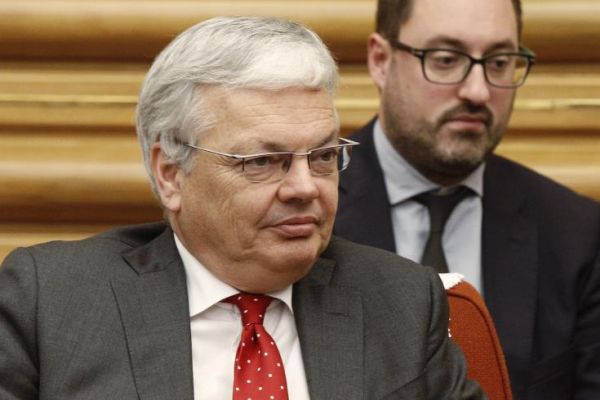
The Commissioner in charge of Justice, Didier Raders, expressed his satisfaction with the intention of Cyprus to start its active participation in the institution of the European Public Prosecutor (EPPO).
The Commissioner, after a telephone conversation with the Minister of Foreign Affairs, stated that he was happy with the result of his discussion with Minister Nikos Christodoulidis “on the determination of Cyprus to start the activity of the EU Prosecutor soon”. He noted that the Cypriot authorities “have made progress” and welcomed the proposals submitted by the Cypriot side regarding the appointment of European Delegated Prosecutors (EDPs).
The EPPO, the European Public Prosecutor's Office, is an independent and decentralized prosecuting authority of the European Union, with responsibility for investigating and prosecuting crimes against the EU budget, such as fraud, corruption or serious cross-border VAT fraud. The Regulation establishing the European Public Prosecutor's Office under enhanced cooperation was adopted on 12 October 2017 and entered into force on 20 November 2017. At this stage, there are 22 participating EU countries.
At present, only national authorities can investigate and prosecute fraud against the EU budget. But their powers stop at national borders. Existing EU bodies such as Eurojust, Europol and the EU Anti-Fraud Office (OLAF) do not have the necessary powers to conduct criminal investigations and prosecutions.
The European Public Prosecutor's Office is currently being set up with a view to launching in March 2021. The European Public Prosecutor's Office is based in Luxembourg.
The European Public Prosecutor's Office will operate as a single office in all participating EU countries and will combine European and national law enforcement efforts in a unified, seamless and effective approach.
The European Public Prosecutor's Office will be built at two levels: the central and the national level.
The central level will consist of the European Advocate General, his two Deputy Prosecutors, 22 European Prosecutors (one per EU participating country), two of whom will be the Deputy Advocates General and the Administrative Director.
The decentralized level will consist of European Representatives Prosecutors, located in the participating EU countries. The central level will oversee investigations and prosecutions carried out at national level. As a rule, European Prosecutors's representatives will conduct investigations and prosecutions in their own country.
The rights of suspects and accused persons will be guaranteed by comprehensive procedural guarantees under existing Community and national law.
The European Public Prosecutor's Office will ensure that its activities respect the rights guaranteed by the EU Charter of Fundamental Rights, including the right to a fair trial and the right to a fair trial.
The procedural acts of the European Public Prosecutor's Office are subject to judicial review by national courts.
The European Court of Justice – through preliminary rulings – has the remaining powers to ensure the consistent application of EU law.
Specifically for the appointment of EDPs from Cyprus, the head of the EPPO Laura Kovesi addressing a joint meeting of the Committees on Civil Liberties, Justice and Home Affairs and Budgetary Control of the European Parliament (LIBE-CONT) on 27 January had estimated that 10% under consideration of cases of the newly established European Public Prosecutor's Office, may concern Cyprus, citing calculation based on data examined by requests for mutual assistance and previous cases.
European Prosecutor Laura Kovesi, head of the EPPO (European Public Prosecutors Office), then noted in her speech the lack of agreement with Finland and Cyprus on the working method of seconded prosecutors from these two countries.
Laura Covesi had said at the time that she would continue to explain to the two Member States that their EPPO rules of procedure enable nationally seconded European prosecutors to work in purely national cases, provided their availability to handle European affairs is not affected.
Regarding the distribution of cases by country, the European Prosecutor specifically stated that “we estimate that we will receive about 3000 cases at the beginning” and since then “about 2000 cases per year”.
Specifically for Cyprus, he stressed “I would like to answer questions related to Cyprus and the risk of blocking the EPPO. It is true that the number of criminal investigations of interest to the EPPO in relation to Cyprus has historically been extremely low. We have recently looked at the experience of some prosecutorial services and mutual assistance requests in relation to Cyprus over the last three years which would be relevant to the EPPO and based on the information we have gathered, we can safely assume that up to 10% of future affairs will have a component related to Cyprus. That is a lot of work and that is why we need full-time prosecutors in Cyprus “.




